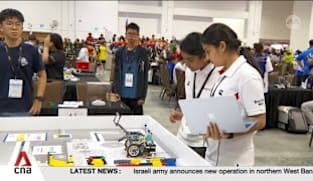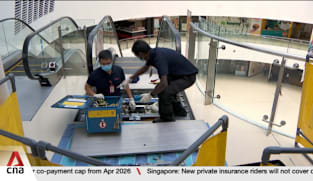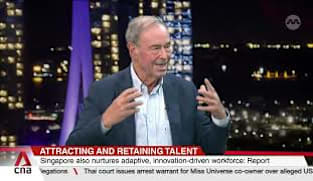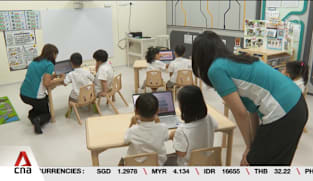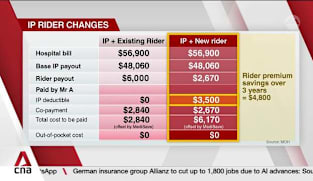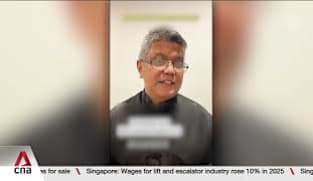Committee of Supply 2024 debate, Day 3: Josephine Teo on building an AI-ready Singapore
In the world of artificial intelligence (AI), there are three broad communities - creators who generate cutting-edge research, practitioners who implement and deploy systems, models and algorithms, and users who are equipped to use AI-powered solutions. Singapore is working to ensure that it can build an AI-ready society on all three tiers, as Communications and Information Minister Josephine Teo outlined the key moves in Parliament on Friday (Mar 1). It will soon launch a new AI Visiting Professorship for world-class researchers to collaborate with Singapore. At the university level, there will be a new AI Accelerated Masters Programme to grow a pipeline of Singaporean researchers. The Government will triple the pool of AI practitioners to 15,000 over the next five years to help enable the use of AI in organisations across the economy. The Government will also enhance training by supporting graduates and mid-career workers who wish to become AI practitioners. Parallel to efforts for the creator and practitioner communities, the Government will equip the broader workforce to be confident AI users. Mrs Teo said this may be the best way to forestall AI-induced job displacement. She said it is not just rank-and-file workers but professionals, managers, executives and technicians who fear that AI tools and agents can take over their tasks. She pointed out that many observers feel that it is not so much AI displacing the workers but “AI-proficient workers displacing AI-deficient workers”. Turning to efforts to support workers impacted by AI, Mrs Teo said there are now 16 Jobs Transformation Maps (JTMs) that have identified job roles affected by various technologies, of which 13 specifically outline the impact of AI. These JTMs cover about 1.4 million workers. Mrs Teo said they have provided useful signposts for employers, unions and workers so that they can plan for job redesign or training interventions. Mrs Teo also stressed the need to guard against the risks of AI misuse. She said the Personal Data Protection Commission has finalised its advisory guidelines. Turning to digital service disruptions, Mrs Teo said the Government will enhance the regulatory levers and expand coverage to include data centres, cloud services and key entities that may hold sensitive data or perform important public functions. She said an Amendment Bill will be introduced in Parliament next week. Another area being looked into is a Digital Infrastructure Act to address broader security and resilience concerns of key digital infrastructure and services beyond cyber security. It will focus on digital infrastructure that can cause significant impact on the economy and society if disrupted, such as large crowds. Providers and data centres that are crucial to the functioning of a wide array of digital services that enterprises and consumers use daily may need to meet higher security and resilience standards. Further studies are being done to properly scope and develop the proposals. Also being explored - non-regulatory measures that will complement Singapore’s laws and regulations. This could include providing guidance to digital infrastructure and service providers on best practices or security and resilience. Turning to the funding for SPH Media Trust, Mrs Teo said around S$320 million has been disbursed across financial years 2022 and 2023. Around S$260 million in funding has been budgeted for FY2024. So far, the funding disbursed has been put to good use, said Mrs Teo. However, there is still “considerable catch-up” for SPH Media. While it has maintained its overall reach and achieved a modest increase in its digital subscriptions, it did not meet all its key performance indicators for digital reach. Mrs Teo also stressed the need for sustained investments in public service media entities, saying it is not a “nice to do” but a “have to do” in order to uphold quality journalism that supports the public good and maintains the high trust from the public.
In the world of artificial intelligence (AI), there are three broad communities - creators who generate cutting-edge research, practitioners who implement and deploy systems, models and algorithms, and users who are equipped to use AI-powered solutions. Singapore is working to ensure that it can build an AI-ready society on all three tiers, as Communications and Information Minister Josephine Teo outlined the key moves in Parliament on Friday (Mar 1). It will soon launch a new AI Visiting Professorship for world-class researchers to collaborate with Singapore. At the university level, there will be a new AI Accelerated Masters Programme to grow a pipeline of Singaporean researchers. The Government will triple the pool of AI practitioners to 15,000 over the next five years to help enable the use of AI in organisations across the economy. The Government will also enhance training by supporting graduates and mid-career workers who wish to become AI practitioners. Parallel to efforts for the creator and practitioner communities, the Government will equip the broader workforce to be confident AI users. Mrs Teo said this may be the best way to forestall AI-induced job displacement. She said it is not just rank-and-file workers but professionals, managers, executives and technicians who fear that AI tools and agents can take over their tasks. She pointed out that many observers feel that it is not so much AI displacing the workers but “AI-proficient workers displacing AI-deficient workers”. Turning to efforts to support workers impacted by AI, Mrs Teo said there are now 16 Jobs Transformation Maps (JTMs) that have identified job roles affected by various technologies, of which 13 specifically outline the impact of AI. These JTMs cover about 1.4 million workers. Mrs Teo said they have provided useful signposts for employers, unions and workers so that they can plan for job redesign or training interventions. Mrs Teo also stressed the need to guard against the risks of AI misuse. She said the Personal Data Protection Commission has finalised its advisory guidelines. Turning to digital service disruptions, Mrs Teo said the Government will enhance the regulatory levers and expand coverage to include data centres, cloud services and key entities that may hold sensitive data or perform important public functions. She said an Amendment Bill will be introduced in Parliament next week. Another area being looked into is a Digital Infrastructure Act to address broader security and resilience concerns of key digital infrastructure and services beyond cyber security. It will focus on digital infrastructure that can cause significant impact on the economy and society if disrupted, such as large crowds. Providers and data centres that are crucial to the functioning of a wide array of digital services that enterprises and consumers use daily may need to meet higher security and resilience standards. Further studies are being done to properly scope and develop the proposals. Also being explored - non-regulatory measures that will complement Singapore’s laws and regulations. This could include providing guidance to digital infrastructure and service providers on best practices or security and resilience. Turning to the funding for SPH Media Trust, Mrs Teo said around S$320 million has been disbursed across financial years 2022 and 2023. Around S$260 million in funding has been budgeted for FY2024. So far, the funding disbursed has been put to good use, said Mrs Teo. However, there is still “considerable catch-up” for SPH Media. While it has maintained its overall reach and achieved a modest increase in its digital subscriptions, it did not meet all its key performance indicators for digital reach. Mrs Teo also stressed the need for sustained investments in public service media entities, saying it is not a “nice to do” but a “have to do” in order to uphold quality journalism that supports the public good and maintains the high trust from the public.










